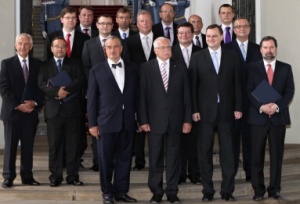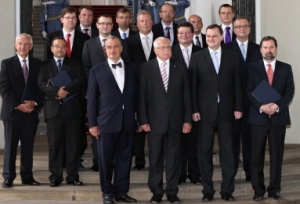By Pavol Stracansky, IPS
PRAGUE, Jul 7, 2010 (IPS) – Women’s rights campaigners say the Czech Republic’s new government has effectively told women they have no relevance to the country’s future after the new cabinet was formed – without a single female minister. Despite a record number of women elected to parliament in elections in May and pre-election pledges by party leaders that they wanted more women in politics, women’s rights activists said they had been given a “slap in the face” after the make-up of the new cabinet was finally agreed last week. Michaela Appeltova from the PadesatProcent (Fifty PerCent) women’s rights organisation told IPS: “The composition of the government is a symbolic signal that women are not relevant to the future of the country because the current government is going to carry out a whole series of massive reforms in all kinds of sectors, public sector, health etc., and women will have no say in this. Their perspective will be completely lost.”Despite advances in equal rights over the last two decades, politics, as well as many other professions in the former Eastern bloc state have remained male- dominated, equal rights campaigners say. As recently as 2002 there had been a cabinet with no women, and the number of women in parliament has been below the European average in previous parliaments. The average number of women in parliaments in countries within the Organisation for Security and Cooperation in Europe (OSCE) is just under 22 percent. In the outgoing Czech parliament, women made up 17 percent of the total number of MPs. Campaigners had welcomed the results of the recent elections after a record 44 women were elected to the lower house of parliament. The number – 22 percent of all MPs – was, say women’s rights groups, especially important in that 14 of those elected had come via a system of preferential votes where voters indicate their support on ballot papers not just for their chosen party but for the candidate of their choice. They say that this had shown that voters wanted more women in politics, and they had been confident that the three parties forming the new coalition government would translate this support for women into the appointment of female ministers. The right-wing ODS party, which won the most votes of the three coalition parties, had said it had a female candidate for a ministerial post. But at the end of lengthy negotiations on forming the cabinet, leaders suggested women had been put off the posts by the tough negotiations. Jana Ciglerova, a prominent writer on equal rights, told Czech media: “It’s an absolute slap in the face. To have a government that has absolutely no women in it is shocking. It’s the third millennium, and yet half of the population is still not represented in the government.” Others accused government leaders of hypocrisy and cynically promoting female candidates and backing more women in politics simply to get votes. ?Appeltova said: “The voters showed that they wanted more women representing them in power. But now the parties have decided on their government with no women, which completely ignores the will of the voters.” Alexandra Jachanova-Dolezelova of the Gender Studies NGO in Prague told IPS: “The situation (with women’s rights) will get worse with this cabinet. It is good to have more women in parliament, but the executive power is with the government, which will now be a men’s club.”
The situation is in stark contrast, at least at the top, to neighbouring Slovakia which is about to have its first ever female prime minister. Iveta Radicova, a 53-year-old former sociologist turned politician, will officially become prime minister when the new coalition government sits for the first time this week. She had last year won the support of equal rights groups when she ran, ultimately unsuccessfully, for the presidency last year. Although she was careful not to present herself as a women’s candidate in the presidential bid — and has again tried to downplay the significance of her gender as the prime minister-elect — women’s rights groups saw her as a de facto standard-bearer for their movement, and described her as “our candidate”. But attitudes to women’s rights in the strongly Catholic country remain conservative. Local rights groups complain of a lack of equality in the workplace, and point to the overwhelming male domination of politics. The new Slovak parliament will have 23 female MPs – one less than the previous parliament, and just 15 percent of the total number of MPs in parliament. Slovak sociologists have said that the election of a woman to the highest ranks of politics in the country will help society by promoting discussion about gender and minorities, while others say that Radicova’s presence as prime minister could help change the political culture simply by breaking the until now almost complete male dominance of the country’s political executive. Czech women’s rights activists say their own country should look to Slovakia as an example. “The appointment of a female prime minister in Slovakia is a great example for us and one the Czech Republic should look to follow,” said Appeltova. But they are meanwhile planning a public campaign including sending an open letter to the coalition parties to try and force the new government to reverse its decision. “We will not give up on this,” said Appeltova.




